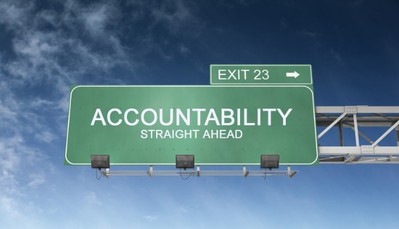
I take my lead from the likes of George Washington, Benjamin Franklin, and Thomas Jefferson. The founding fathers were entrepreneurs and innovators in every sense of the way we think of those words today. The risks they took to establish the United States of America required personal initiative and accountability of themselves and those around them.
It appears that we are getting further away from that type of accountability as a society, specifically within the business community. Almost on a daily basis, I witness a lack of responsibility being fostered and tolerated by businesses leaders. The irony is, as leaders, they are not doing any favours to the employees they are not holding accountable or to the company they work for. Deep down, everybody knows and, often, key people are watching the inept behaviour of the leaders in charge.
From my experience, there are some key “accountability” pitfalls that business leaders typically fall into. Some of them don’t even appear to be accountability-related on the surface, which is why they’re so insidious. If you want a high-performance organization make sure you avoid them:
- Unclear responsibility. This is probably the most common pitfall. Show me an underperforming organisation and I’ll show you managers with misaligned goals, employees with vague responsibilities, and a lack of measurement processes to make sure things get done. The key is to ensure goals and responsibilities are properly aligned. Due to the lack of clear responsibilities, employees and leaders will start covering their behinds, pointing fingers, and acting passive aggressively — all sorts of dysfunctional behavior that wreaks havoc with organizational performance.
- No follow up. This is practically an epidemic in organizations. Executives are great at coming up with goals, strategies, even metrics. Unfortunately, they’re also notoriously bad at following up. Without follow up, nothing good happens. Companies must have a relatively objective and strict process for both setting and scoring employee performance, including the leadership team. If an employee does not feel that they are going to be held accountable, what is the incentive to keep a project on time and on budget? The result is mediocre projects, services, and firm profits.
- Management misbehaviour. When it comes to poor behaviour of the managers in charge, most high level leaders and boards just look the other way. They are conflict avoiders. I recently witnessed a board ignore the behavior of a key board member who missed a crucial deadline by almost two months without a plausible explanation. Rather than remove him from his position, he was left in place, despite his failure to execute. It was decided that the best course of action was to give him “one more chance.”
That lack of accountability plays a key role in business failures because dysfunctional leadership results in bad strategic decision-making and poor employee performance and execution. Granted, coming up with metrics for this sort of thing is challenging, but I think key performance indicators and quarterly (reviews) are pretty effective.
- Flawed corporate strategy. This is rarely seen as an accountability problem, but it is. When company leaders push a flawed strategy, smart people in the organisation call them on it — publicly or privately — word gets around, and management credibility suffers, big-time.
- Territorialism and silos. We recently had a client have a long-term manager conduct initial interviews of potential key hires. This person badmouthed his company with our candidates during the entire interview. When we brought this behaviour to the attention of senior management, we were greeted with a chorus of “that’s just the way so-and-so is,” and “he always does the first interviews, we can’t take that responsibility from him.” This client was focused on the needs (ego) of the inept employee, not the needs of the organisation.
To locate a strong example of 20th century leader, consider James Burke of Johnson & Johnson and how he deftly handled the Tylenol tampering of 1981. Burke placed consumers first by recalling 31 million bottles of Tylenol capsules from store shelves and offering replacement product in the safer tablet form, free of charge. The move cost Johnson & Johnson more than $100 million. He focused on keeping people safe first, and profits second. Burke received the Presidential Medal of Freedom from President Bill Clinton in 2000. In 2003, Fortune magazine named him one of history’s 10 greatest CEOs. He made difficult decisions that held to the company values.
I find that executive management teams at consistently successful companies make accountability a priority and, therefore, avoid these accountability pitfalls.


 RSS Feed
RSS Feed
